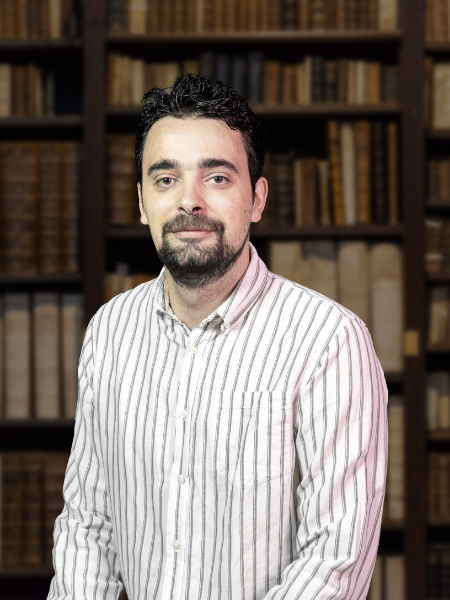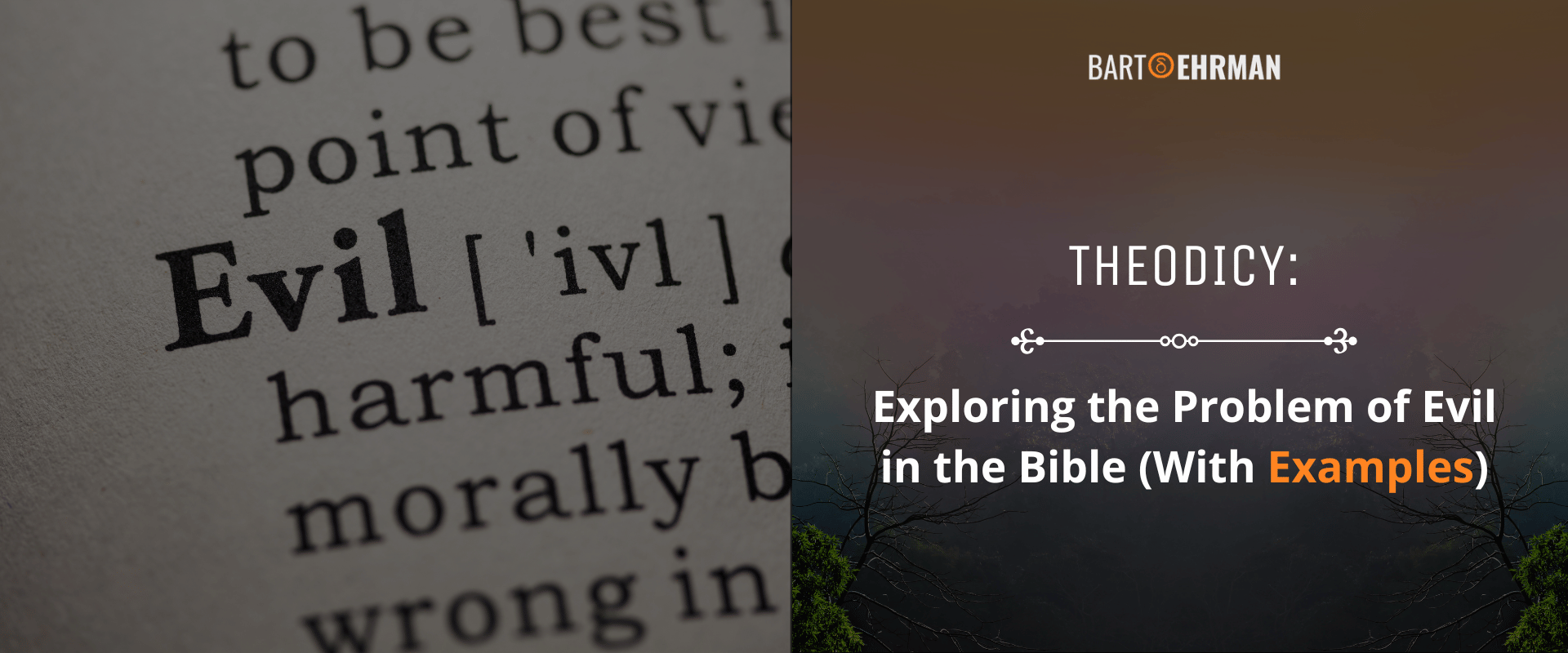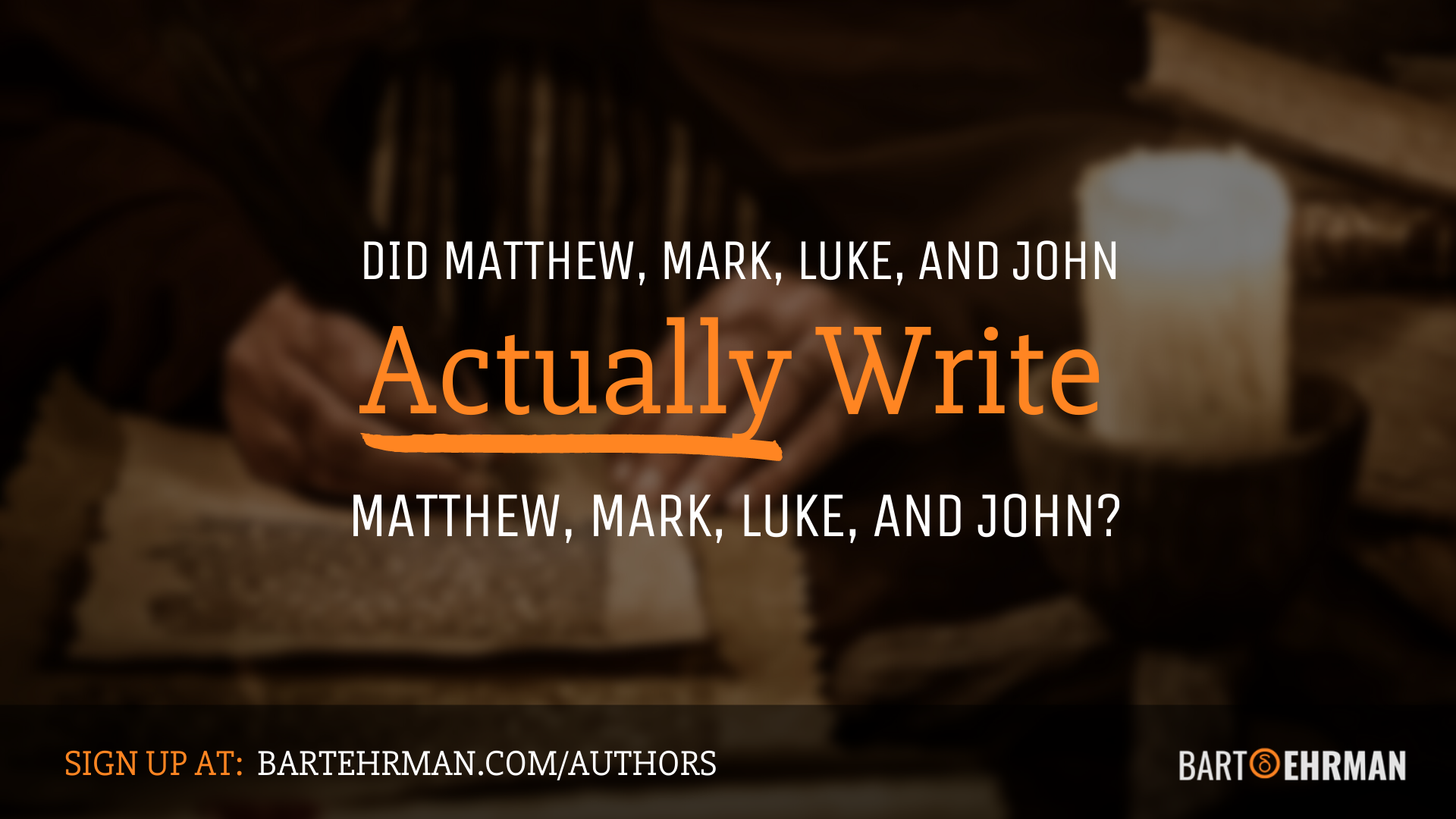Theodicy: Exploring the Problem of Evil in the Bible (With Examples)

Written by Marko Marina, Ph.D.
Author | Historian
Author | Historian | BE Contributor
Verified! See our guidelines
Verified! See our editorial guidelines
Date written: November 21st, 2024
Edited by Laura Robinson, Ph.D.
Disclaimer: The views and opinions expressed in this article belong to the author and do not necessarily match my own. - Dr. Bart D. Ehrman
It was the spring of 1992 when war suddenly erupted in Bosnia and Herzegovina, forcing my family and me — then only a four-month-old baby — to flee our home. As Serbian forces advanced, they took whatever held value and destroyed all that remained. This conflict, which raged on for more than four years, left behind a tragic toll: Tens of thousands of lives lost, including hundreds of children.
It’s difficult, perhaps impossible, to comprehend how such devastating events can occur in a world governed by a supposedly benevolent, omnipotent God. This struggle between faith and the realities of suffering brings us to one of the most profound and complex issues in religious philosophy: theodicy.
The term theodicy encompasses various attempts to understand the coexistence of a loving, powerful deity and the existence of evil.
Throughout history, philosophers and theologians have proposed different frameworks to address this question. Some view suffering as a necessary part of human growth. In contrast, others interpret it as a mystery beyond human comprehension or believe that ultimate justice will be achieved beyond this life.
This article will explore some of the most prominent theodicy examples, beginning with foundational explanations for why suffering exists. We’ll then examine different types of theodicies, such as the Free Will Defense, Soul-Making Theodicy, and the notion of Divine Mystery, before turning to theodicy in biblical texts, notably the Book of Job.
While these discussions certainly won’t provide definitive answers, they offer valuable insights into one of humanity's oldest and most persistent questions: Why does evil exist if a loving God created this world?

Theodicy Meaning and Roots
The term theodicy finds its roots in the Greek words “theos” (“θεός”), meaning “God,” and “dikē” (“δίκη”), meaning “justice” or “judgment.”
At its core, theodicy is an intellectual and theological attempt to justify the goodness and justice of God despite the existence of evil in the world. This challenge — often called “the problem of evil” — is one of the most enduring and complex dilemmas in the philosophy of religion.
It boils down to the apparent contradiction between three statements that many believers hold to be true: (1) God is good, (2) God is omnipotent, and (3) there is much evil in the world.
In his book God’s Problem, Bart D. Ehrman explains the nuances of this contradiction:
(Affiliate Disclaimer: We may earn commissions on products you purchase through this page at no additional cost to you. Thank you for supporting our site!)
If God is all-powerful, then he can do whatever he wants (and can therefore remove suffering). If he is all-loving, then he obviously wants the best for people (and therefore does not want them to suffer). And yet people suffer. How can that be explained?
The Stanford Encyclopedia of Philosophy website defines theodicy as an endeavor to reconcile these seemingly irreconcilable claims by showing that the attributes of justice, goodness, and omnipotence can, indeed, be consistent with the existence of evil.
In this sense, theodicy isn’t merely about accepting or ignoring evil but about grappling with its presence in a world supposedly governed by a benevolent deity. This challenge becomes particularly significant as we consider different forms of evil, from natural disasters to human atrocities, and wonder how (or if!) they can be in line with the idea of a moral universe and a loving God who created it.
While theodicy is often seen as an apologetic response, aiming to defend belief in a loving God, it's crucial to distinguish between a mere defense of faith and a full-fledged theodicy.
In The Blackwell Companion to Philosophy, Charles Taliaferro explains:
A defense seeks to establish that rational belief that God exists is still possible and that the existence of evil does not make it improbable that God exists... In a theodicy, the project is not to account for each and every evil but to provide an overarching framework within which to understand at least roughly how the evil that occurs is part of some overall good — for instance, the overcoming of evil is itself a great good.
Here, Taliaferro underscores the difference between a defense that preserves the logical possibility of God’s existence and a theodicy that attempts to offer a broader, more systematic understanding of how evil might serve a higher purpose.
This distinction is essential to any study of theodicy, as it helps clarify that theodicy doesn’t attempt to minimize or trivialize the real pain and suffering in the world. Instead, it seeks to create a conceptual framework that allows believers to understand suffering as something that could potentially coexist with divine goodness.
This framework doesn’t aim to resolve every individual case of suffering but rather to provide a philosophical approach to understanding why evil might be present in a world created by a just and loving God. And the reality of evil is undeniable. Sadly, we don’t have to look far to find some of the most harrowing examples, as we’ll explore in the next section of our article.
Theodicy: Examples
“Never shall I forget that night, the first night in camp,” Elie Wiesel wrote, “which has turned my life into one long night, seven times cursed and seven times sealed. Never shall I forget that smoke. Never shall I forget the little faces of the children, whose bodies I saw turned into wreaths of smoke beneath a silent blue sky.”
Wiesel’s words, describing his experience in a Nazi concentration camp, capture a level of human-inflicted suffering so profound that it defies comprehension. The atrocities of the Holocaust, where millions of innocent men, women, and children perished, serve as one of the starkest examples of ontological evil!
Thinking of the Holocaust inevitably brings us back to the theodicy problem. This unimaginable event has shaken the faith of many, including Rabbi David Wolpe, who recounts its impact on him in his book Why Faith Matters:
The image that shocked me into disbelief was of corpses bulldozed into huge holes in the ground. These were once living human beings, mothers and children and siblings and grandparents; now they were piles of inert flesh, pushed into the unforgiving earth by machine. Spirit suddenly drained from the world. Surely, if there was a God, this would not be permitted. I walked out after seeing that movie [Night and Fog] onto the green sloping field of the camp and looked down at the lake, convinced there was no God.
Moral evils such as Nazism are undeniably part of the human story, yet they aren’t the only forms of suffering that afflict our world. Nature itself often appears to unleash indiscriminate devastation. For example, the 2004 Indian Ocean tsunami claimed the lives of nearly 230,000 people across 14 countries, displacing millions and shattering families in an instant.
Similarly, consider the eruption of Mount Vesuvius in 79 C.E., recounted in the works of Pliny the Younger. The eruption buried the cities of Pompeii and Herculaneum in ash and pumice, killing thousands of people in a matter of hours. Archaeological evidence reveals entire families frozen in their final moments. I remember visiting the site last year with my students and thinking about the level of suffering that one eruption caused.
Types of Theodicies
These examples of moral and natural evil underscore the challenge of theodicy. With that in mind, we’ll now proceed to types of theodicies and briefly explain how they seek to comprehend and answer the problem of evil that is undeniably part of this world.
Free Will Defense
The Free Will Defense traces its origins to St. Augustine, who argued that free will is the source of moral evil in the world. Augustine’s argument is built on the premise that if God is truly good, everything created by God must inherently be good as well. Consequently, moral evil couldn’t originate directly from God.
Instead, Augustine proposed that moral evil arises from human beings' misuse of free will — a capacity for choice that God created. According to Augustine, free will is itself a good thing, as it enables individuals to choose righteousness and love. However, this same free will also makes sin possible; without it, moral good and evil would be impossible.
Thus, in choosing to create a world where free will exists, God inevitably allows for the potential of freely chosen evil alongside freely chosen good.
This concept is further developed in Augustine’s On Free Choice of the Will, where he suggests that a world containing evil may paradoxically be better than a world devoid of evil. Augustine argued that a universe containing only flowers, birds, and other non-sentient beings might be beautiful, but it would lack moral dimensions entirely, with no opportunity for moral virtues such as love, justice, or courage to manifest.
In Augustine’s view, the presence of moral evil is justified if it makes room for the greater good that can come from free will.
Furthermore, he contended that God permitted moral evil so that he could ultimately bring forth an even greater good. A classic example of this idea is Adam and Eve’s fall, which, according to Augustine, was permitted by God to allow for the eventual redemption of humanity through Jesus’ suffering and death.
Did You Know?
Epicurus and the Ancient Roots of the Problem of Evil
The problem of evil is something that has challenged intellectuals even before Christianity emerged. One of the earliest known formulations comes from the ancient Greek philosopher Epicurus (341-270 B.C.E.), who posed a thought-provoking set of questions about the nature of divine power and goodness.
Known as the Epicurean paradox, these questions challenge the idea that a benevolent and omnipotent God could allow evil to exist in the world. Epicurus asks: If God is willing to prevent evil but not able, is he then powerless? If he is able but not willing, is he malevolent? And if he is both willing and able, why does evil exist at all?
Epicurus’ paradox is one of the earliest arguments in Western thought to suggest a possible inconsistency between the existence of evil and the traditional attributes assigned to a deity — omnipotence and omnibenevolence. Although Epicurus didn’t offer a direct solution to his paradox, his formulation laid the groundwork for later discussions on theodicy.
Interestingly, Epicurus’ ideas were preserved and transmitted largely thanks to the later Roman poet and philosopher Lucretius, who admired Epicurean philosophy and promoted it in his epic poem De Rerum Natura (On the Nature of Things).
Centuries later, German philosopher Gottfried W. Leibniz (1646-1716) offered a modified version of Augustinian theodicy in his Discourse on Metaphysics, where he famously posited that this world is “the best of all possible worlds.”
Leibniz argued that even with the existence of evil, the world we inhabit is the optimal outcome among all conceivable worlds, as it contains the highest possible balance of good and evil. This notion implies that, although a world without evil might be conceivable, such a world would lack significant goods that only free beings are capable of achieving.
In more recent times, philosopher Alvin Plantinga advanced the “Free Will Defense” with a nuanced metaphysical argument based on “middle knowledge.”
According to this view, God possesses knowledge of what any individual would freely choose in any possible situation. Plantinga argues that God, therefore, can’t create a world where someone makes a choice they wouldn’t have made under those particular circumstances.
In this sense, God’s creative power is limited — not by a lack of omnipotence, but by the necessity of preserving genuine free will. Plantinga’s argument maintains that God can’t “actualize” a possible world in which individuals act against their freely made choices, thereby affirming that the presence of evil is, in part, a necessary consequence of granting humanity the freedom to choose.
Soul-Making Theodicy
The Soul-Making Theodicy, championed by thinkers such as the British philosopher John Hick, posits that the existence of evil and suffering can be understood as necessary elements in human spiritual and moral growth.
Unlike the Free Will Defense, which primarily addresses moral evil, the Soul-Making Theodicy suggests that both moral and natural evils serve constructive purposes. Hick, in his influential work Evil and the God of Love, argued that a world devoid of challenges and hardships wouldn’t foster the development of virtues such as compassion, resilience, and courage.
This theodicy is rooted in the concept that humans are created in an “immature” state and must undergo a process of spiritual maturation.
According to Hick, encountering and overcoming suffering is essential to this developmental process, as it allows individuals to move from a purely self-centered existence to a more compassionate and morally aware life.
Furthermore, proponents of the Soul-Making Theodicy argue that, while suffering is undeniably painful, it plays a crucial role in shaping character and fostering empathy. Through trials, individuals learn to confront life’s difficulties, growing stronger and more morally refined in the process.
Divine Mystery: What If We Aren’t Meant to Know?
The Divine Mystery theodicy suggests that the limitations of human knowledge prevent us from fully understanding God’s reasons for allowing evil and suffering in the world. This perspective argues that, as finite beings, humans may not be equipped to grasp the entirety of God’s intentions or actions, including the presence of evil.
Proponents of this view often point to the notion of divine transcendence — that God’s nature, motives, and overall plan are beyond human comprehension. For instance, William L. Craig notes:
As finite persons, we are limited in time, space, intelligence, and insight. But the transcendent and sovereign God sees the end from the beginning and providentially orders history so that His purposes are ultimately achieved through human free decisions. In order to achieve His ends, God may have to put up with certain evils along the way. Evils that appear pointless to us within our limited framework may be seen to have been justly permitted within God’s wider framework.
Furthermore, the Divine Mystery theodicy finds resonance in the works of theologians such as Karl Barth and Søren Kierkegaard, who emphasize the “otherness” of God — a God whose purposes and nature remain fundamentally different from human logic.
According to this view, attempts to rationalize suffering might ultimately be flawed because they assume that divine reasoning aligns with human values and perceptions.
Eschatological Resolution
The Eschatological Resolution theodicy addresses the problem of evil by proposing that all suffering and injustice will ultimately be resolved in the afterlife. This view holds that, while suffering and moral wrongdoing may go unpunished or unrewarded in this life, ultimate justice will be met in a future, transcendent state.
In Christian theology, the idea of eschatological resolution is grounded in the concept of the last judgment, where individuals are rewarded or punished based on their beliefs and actions. This idea posits that God, as a just and omniscient being, will ultimately rectify all wrongs, whether through divine reward or retribution.
The Catechism of the Catholic Church, for example, notes:
In the presence of Christ, who is Truth itself, the truth of each man's relationship with God will be laid bare. The Last Judgment will reveal even to its furthest consequences the good each person has done or failed to do during his earthly life... The Last Judgment will come when Christ returns in glory. Only the Father knows the day and the hour; only he determines the moment of its coming. Then through his Son Jesus Christ, he will pronounce the final word on all history... The Last Judgment will reveal that God's justice triumphs over all the injustices committed by his creatures and that God's love is stronger than death.
This theodicy also holds that earthly life can be seen as a temporary phase in a much grander divine narrative. By extending the timeline of justice and resolution beyond the bounds of earthly life, the Eschatological Resolution provides an alternative way of reconciling the existence of suffering with divine goodness.

Theodicy in the Bible: The Story of Job
The Book of Job is one of the Bible’s most profound explorations of suffering, serving as a case study for grappling with unanswered questions in the face of immense hardship. Job is introduced as a righteous man, faithful to God, and blessed with wealth, family, and health.
Yet, in a striking turn of events, he loses everything. His wealth is destroyed, his children are killed, and he is afflicted with painful sores across his body. Despite his innocence, Job experiences suffering on an almost incomprehensible scale, raising the central question of the book: Why does a just God allow a faithful person to endure such agony?
Throughout the narrative, Job’s friends insist that he must have sinned to deserve such punishment, thus reflecting the common ancient belief in retributive justice.
However, Job continuously asserts his innocence, refusing to accept that his suffering is a result of wrongdoing. He demands an explanation from God, seeking clarity on why he, a righteous man, has been subjected to such profound loss and misery.
In chapter 38, God finally responds to Job, appearing in a whirlwind. Rather than providing direct answers, God’s response presents Job with a series of rhetorical questions about the vast and intricate workings of the natural world — questions that emphasize Job’s limited understanding.
Scholars have long debated the meaning behind God’s response. Some, including Jewish philosopher Martin Buber, suggest that God’s mere appearance serves as the answer, with Job acknowledging in chapter 42 verse 5: “I had heard of you by the hearing of the ear, but now my eye has seen you.”
Others interpret God’s message as twofold. First, God emphasizes that Job can’t possibly understand the complexity of creation or the divine nature, implying that some things are simply beyond human grasp. Second, God underscores that divine justice doesn’t always operate on a retributive basis.
In chapter 39, for example, God uses the seemingly absurd behavior of an ostrich — a creature that forgets where it has laid its eggs and occasionally crushes them — to illustrate that the natural world doesn’t always conform to human notions of justice or order.
God’s response thus challenges Job’s — and the reader’s — expectations of clear, retributive justice. While God is indeed capable of retribution, as shown when He ultimately restores Job’s fortunes, He asserts that not all suffering aligns with humans’ understanding of fairness.
But does Job get clear and definitive answers about his misfortune and sufferings? Does he get answers to the things most of the people who go through tragedies of all sorts probably wonder about?
Bart D. Ehrman thinks the answer must be negative. In his already-mentioned book God’s Problem, he notes:
God does not explain why Job suffers. He simply asserts that he is the Almighty and, as such, cannot be questioned. He does not explain that Job had committed sins of which he was simply unaware. He does not say that the suffering did not come from him but from other humans (or demonic beings) who were behaving badly toward Job. He does not indicate that it has all been a test to see if Job would remain faithful. His only answer is that he is the Almighty who cannot be questioned by mere mortals and that the very quest for an answer, the very search for truth, the very impulse to understand is an affront to his Powerful Being. God is not to be questioned and reasons are not to be sought.
While a thorough exploration of the nuances and varied interpretations of the Book of Job lies beyond the scope of this article, even a surface reading reveals the profound issue of theodicy — a question that has captivated philosophers and theologians for over two thousand years since Job’s story was first told.
Conclusion
The question of theodicy remains as complex and unresolved today as it was in the time of Epicurus, Augustine, and Job. Philosophers, theologians, and individuals alike have long struggled to understand how a world rife with suffering and evil could coexist with a benevolent, omnipotent deity.
While various theodicies attempt to reconcile these seemingly contradictory realities, no single explanation provides a fully satisfying answer. Perhaps, no answer can be given because it’s not an intellectual problem as much as it’s emotional and (for many) deeply personal.
And what do I think? Honestly, I don’t have an answer. I don’t know why so much suffering, pain, and injustice exists in the world. What I do know is that we each have a role in trying to make this world a better place, to leave it kinder and more just than we found it.
FREE COURSE!
WHY I AM NOT A CHRISTIAN
Raw, honest, and enlightening. Bart's story of why he deconverted from the Christian faith.
Over 6,000 enrolled!

